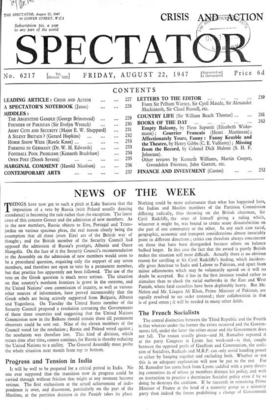Progress and Tension in India
It will be well to be prepared for a critical period in India. No one ever supposed that the transition now in progress could be carried through without friction that might at any moment become serious. The first enthusiasm at the actual achievement of inde- pendence is over, and discontent, particularly on the part of the Muslims, at the partition decision in the Punjab takes its place. Nothing could be more unfortunate than what has happened here, the Indian and Muslim members of the Partition Commission differing radically, thus throwing on the British chairman, Sir Cyril Radcliffe, the onus of himself giving a ruling which, whatever it might be, was bound to create acute dissatisfaction on the part of one community or the other. In any such case racial, geographic, economic and transport considerations almost invariably point in different directions ; critics can therefore always concentrate on those that have been disregarded because others on balance bulked larger. In this case the fact that the award is purely British makes the situation still more difficult. Actually there is no obvious reason for cavilling at Sir Cyril Radcliffe's finding, which incident- ally gives Amritsar to India and Lahore to Pakistan, and apart from minor adjustments which may be voluntarily agreed on it will no doubt be accepted. But it has in the first instance tended rather to stimulate than to check the racial outbreaks in the East and West Punjab, where fatal casualties have been deplorably heavy. But Mr. Nehru and Mr. Liaquat Ali Khan, Prime Minister of Pakistan, are equally resolved to see order restored ; their collaboration in that is of good omen ; it will be needed in many other fields.


































